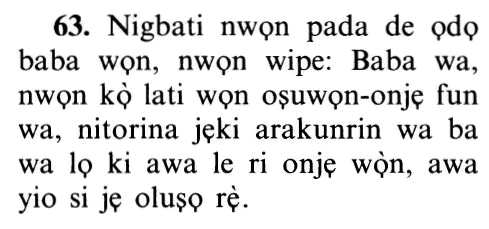12vs63
Select any filter and click on Go! to see results
فَلَمَّا رَجِعُوا إِلَى أَبِيهِمْ قَالُواْ يَا أَبَانَا مُنِعَ مِنَّا الْكَيْلُ فَأَرْسِلْ مَعَنَا أَخَانَا نَكْتَلْ وَإِنَّا لَهُ لَحَافِظُونَ
Falamma rajaAAoo ila abeehim qaloo ya abana muniAAa minna alkaylu faarsil maAAana akhana naktal wainna lahu lahafithoona
Index Terms
Click to play
Yoruba Translation

Hausa Translation
To, a lõkacin da suka kõma zuwa ga ubansu, suka ce: "Yã bãbanmu! An hana mu awo sai ka aika ɗan´uwanmu tãre da mu. Zã mu yi awo. Kuma lalle ne, haƙĩƙa mũ, mãsu lũra da Shi ne."
Asbabu n-Nuzuul (Occasions of Revelation)
Yusuf's Brothers ask Yaqub's Permission to send Their Brother Binyamin with Them to Egypt
Allah tells:
فَلَمَّا رَجِعُوا إِلَى أَبِيهِمْ ...
So, when they returned to their father,
... قَالُواْ يَا أَبَانَا مُنِعَ مِنَّا الْكَيْلُ ...
they said: "O our father! No more measure of grain shall we get...''
after this time, unless you send our brother Binyamin with us.
... فَأَرْسِلْ مَعَنَا أَخَانَا نَكْتَلْ ...
So send our brother with us, and we shall get our measure
Some scholars read this Ayah in a way that means,
`and he shall get his ration.'
They said,
... وَإِنَّا لَهُ لَحَافِظُونَ ﴿٦٣﴾
and truly, we will guard him.
`do not fear for his safety, for he will be returned back to you.'
This is what they said to Ya`qub about their brother Yusuf,
أَرْسِلْهُ مَعَنَا غَدًا يَرْتَعْ وَيَلْعَبْ وَإِنَّا لَهُ لَحَافِظُونَ
"Send him with us tomorrow to enjoy himself and play, and verily, we will take care of him.'' (12:12)
This is why Prophet Yaqub said to them,
يقول تعالى عنهم إنهم رجعوا إلى أبيهم " قالوا يا أبانا منع منا الكيل " يعنون بعد هذه المرة إن لم ترسل معنا أخانا بنيامين فأرسله معنا نكتل وإنا له لحافظون قرأ بعضهم بالياء أي يكتل هو " وإنا له لحافظون " أي لا تخف عليه فإنه سيرجع إليك وهذا كما قالوا له في يوسف" أرسله معنا غدا يرتع ويلعب وإنا له لحافظون" .
"فلما رجعوا إلى أبيهم قالوا يا أبانا منع منا الكيل" إن لم ترسل أخانا إليه "فأرسل معنا أخانا نكتل" بالنون والياء
لأنه قال لهم : " فإن لم تأتوني به فلا كيل لكم عندي " وأخبروه بما كان من أمرهم وإكرامهم إياه , وأن شمعون مرتهن حتى يعلم صدق قولهم .
I'raab - grammatical analysis of the Qur'an
«فَلَمَّا» الفاء عاطفة ولما الحينية.
«رَجَعُوا» ماض وفاعله والجملة مضاف إليه.
«إِلى أَبِيهِمْ» إلى حرف جر أبي اسم مجرور بالياء لأنه من الأسماء الخمسة والهاء مضاف إليه متعلقان برجعوا والجملة معطوفة على ما سبق.
«قالُوا» ماض وفاعله والجملة لا محل لها من الإعراب.
«يا» نداء.
«أَبانا» منادى منصوب بالألف لأنه من الأسماء الخمسة ونا مضاف إليه والجملة مقول القول.
«مُنِعَ» ماض مبني للمجهول.
«مِنَّا» متعلقان بالفعل.
«الْكَيْلُ» نائب فاعل والجملة كسابقتها.
«فَأَرْسِلْ» الفاء الفصيحة والجملة لا محل لها لأنها وقعت جواب شرط غير جازم.
«مَعَنا» ظرف مكان متعلق بالفعل ونا مضاف إليه.
«أَخانا» مفعول به منصوب بالألف لأنه من الأسماء الخمسة ونا مضاف إليه.
«نَكْتَلْ» مضارع مجزوم لأنه جواب الطلب وفاعله مستتر.
«وَإِنَّا» الواو حالية وإن واسمها.
«لَهُ» متعلقان بالخبر.
«لَحافِظُونَ» اللام المزحلقة وحافظون خبر مرفوع بالواو لأنه جمع مذكر سالم والجملة في محل نصب على الحال.
